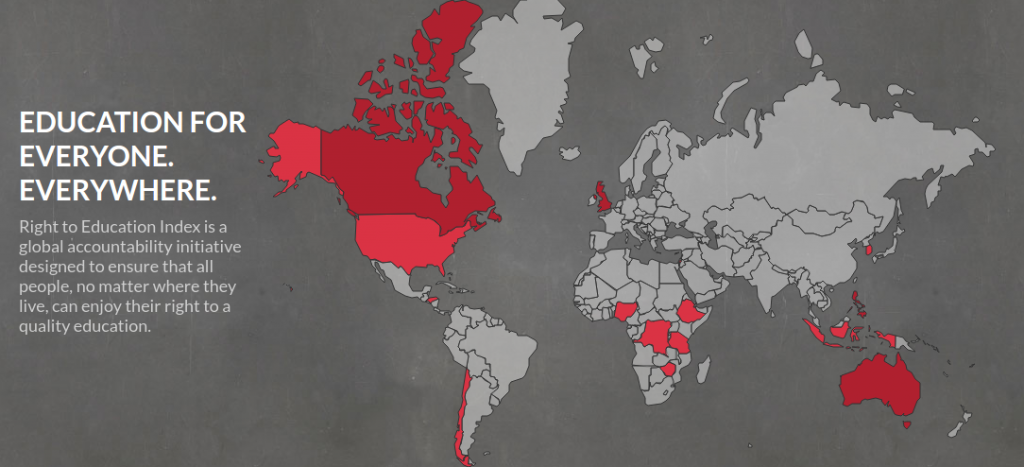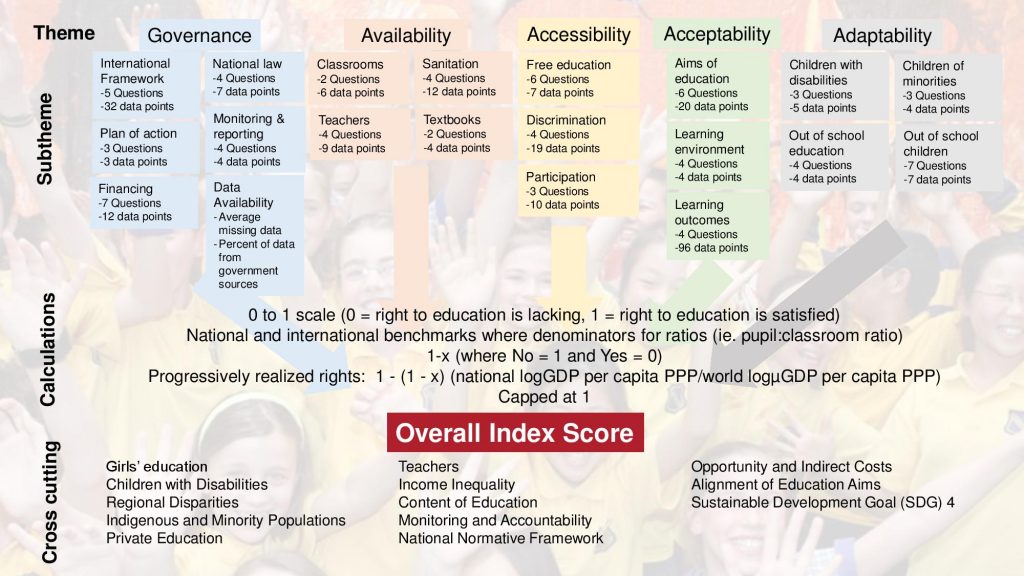RESULTS Educational Fund and Open Knowledge International are pleased to present the 2016 data from the Right to Education Index (RTEI), a global accountability initiative that aims to ensure that all people, everywhere, enjoy the right to a quality education. RTEI is an action research project using a monitoring tool based on international human rights law and collecting data about the right to education with national civil society organizations. In 2016 RTEI approached us to develop a platform to facilitate an open public dialogue on the right to education across the world, inline with our mission to empower civil society organisations to use open data to improve people’s lives. The current site sees a number of improvements to the site, along with the new data. Civil society organizations, advocates, researchers, and policy makers then use the data in national advocacy campaigns and to better understand national satisfaction of the right to education. The resulting data is now available at www.rtei.org.
RTEI 2016 collected data with civil society partners in 15 countries:
- Basic Education Network Ethiopia (BEN-E)
- Civil Society Action Coalition on Education for All (CSACEFA, Nigeria)
- Civil Society Network for Education Reforms (E-Net, the Philippines)
- Coalition Nationale de l’Éducation Pour Tous (CONEPT/RDC, Democratic Republic of Congo)
- Education Coalition of Zimbabwe (ECOZI)
- Foro Dakar (Honduras)
- Foro por el Derecho a la Educación (Chile)
- Global Campaign for Education – United States (GCE-U.S.)
- HakiElimu (Tanzania)
- Network for Education Watch (NEW, Indonesia)
- RESULTS Canada
- RESULTS International Australia
- RESULTS Korea
- RESULTS UK
- Teacher Creativity Center (TCC, Palestine)
Civil society partners completed the RTEI Questionnaire. Their findings were peer reviewed by two national independent researchers and provided to government officials for their feedback and comments.
The Questionnaire consists of five themes (Governance, Availability, Accessibility, Acceptability, and Adaptability, see link). Index scores are derived by the average of theme scores. Theme scores are an average of subtheme scores, which are calculated by averaging representative data points. Unique values are also calculated to account for:
- Missing data;
- National minimum standards concerning pupil-per-classroom, pupil-per-trained teacher, pupil-per-toilet, and pupil-per-textbook ratios;
- Disaggregated outcome and enrollment data by gender, rural and urban disparity, income quintiles, and disability status;
- Progressively realized rights weighted by GDP per capita purchasing power parity (PPP).
Further information about calculations is available on rtei.org and will be detailed in a forthcoming RTEI technical brief.
The resulting data for 2016 is now available at www.rtei.org. In 2016, RTEI found that Australia, Canada, and the UK had the most robust framework for the right to education across the five themes represented in RTEI; Governance, Availability, Accessibility, Acceptability, and Adaptability. Each theme is made up of subthemes specifically referenced in the international right to education framework. Australia’s, Canada’s, and the UK’s scores were highest on Availability, reflecting the infrastructure and resources of schools, including textbooks, sanitation, classrooms, and pupil-per-trained teacher ratios.
On the Index’s other end, Chile, the DRC, and Zimbabwe struggled to satisfy indicators monitored in RTEI 2016. These countries had low Acceptability or Adaptability scores, signifying weaker education systems and difficulty addressing progressively realized rights, such as the rights of children with disabilities. For all RTEI 2016 participating countries, the lowest scoring theme was Adaptability, focused on education for children with disabilities, out-of-school children, and out-of-school educational opportunities. Outside of Adaptability indicators, the Classrooms subtheme had the lowest average score of all Availability subthemes across all countries because of the lack of infrastructure data available in RTEI 2016 and high pupil-per-classroom ratios in several countries. RTEI 2016 also included an analysis of education financing given increase attention to equitable resource allocation and access worldwide.
Research to Action
In 2017, RTEI enters the advocacy phase of data application. In January 2017, RESULTS Educational Fund invited ten current RTEI partners from the Global South to submit proposals to implement in-country advocacy strategies in 2017 using RTEI 2016 findings. RESULTS and RTEI Advisory Group members reviewed applications and selected the following five RTEI 2017 Advocacy Partners:
- Honduras – Foro Dakar will use data collected in RTEI 2016 related to SDG 4 to focus on national education sector planning, discrimination, and monitoring progress towards SDG 4.
- Indonesia – New Indonesia will use data about teacher quality and education for children with disabilities to implement strategies focused on improving national training programs related to inclusive education to further the right to education.
- Palestine – Teacher Creativity Center (TCC) will use data related to SDG 4 to measure progress towards SDG 4 through shadow reporting to UNESCO, the UN Special Rapporteur on the right to education, the Ministry of Education in Palestine, and local media.
- Tanzania – HakiElimu will use data specifically about girls’ education and inclusive education to focus advocacy on evidence-based policies that promote girls’ education, inclusive, and quality education.
- Zimbabwe – Education Coalition of Zimbabwe (ECOZI) will highlight RTEI 2016 findings about continued use of corporal punishment in schools to develop and disseminate alternative policy on positive discipline in schools, training Parliamentarians on corporal punishment issues, and submitting policy recommendations on corporal punishment and free education.
RESULTS and other RTEI partners look forward to supporting these advocacy strategies throughout 2017. Be on the lookout for in-country advocacy updates from our partners posted on www.rtei.org.
Ally Krupar is the Senior Associate on the Right to Education Index, an international research and advocacy project of RESULTS Educational Fund. She is an ABD PhD Candidate in Adult Education and Comparative and International Education at Penn State. She also teaches at American University in the School of International Service and School of Professional and Extended Studies. Over the past three years, she was a Visiting Researcher in Dadaab, Kenya, conducting project evaluations and dissertation fieldwork with refugees. She holds a MA from AU focusing on conflict resolution and human rights, and anthropology BA from Case Western Reserve University.










